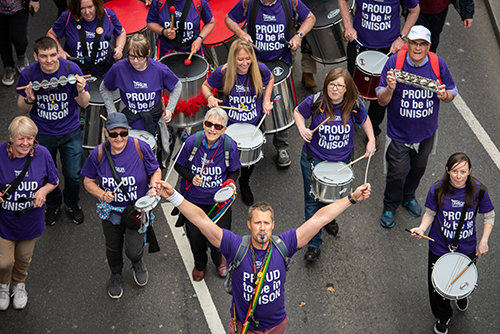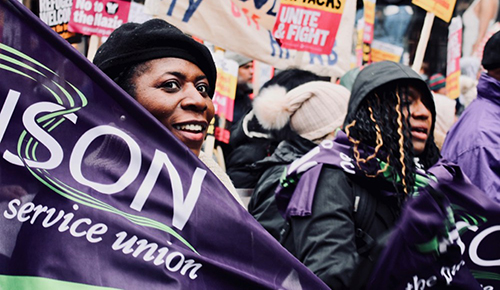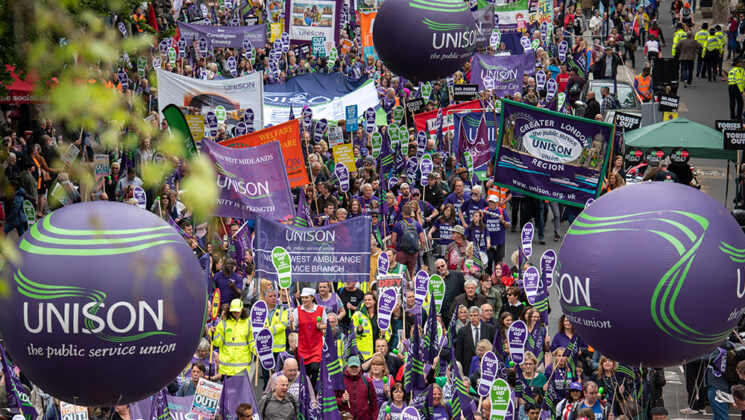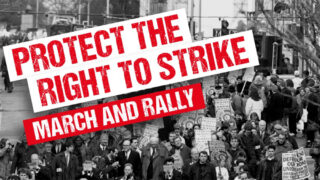With millions of workers across the country struggling to keep their heads above water, you could be forgiven for thinking that you only have to mention a demonstration for people to sign up and take part.
Unfortunately, that’s not usually the case, as experience over the years has shown many activists.
So, it’s always worth sharing ideas – and examples of occasions when galvanising members really works.
Here are a few hints from two UNISON stalwarts, who know the problems, but also have proven approaches that can overcome them.
Working with others
Yorkshire and Humberside UNISON area organiser Joe Gibbons is also the joint secretary of the Hull and District Trades Council, which he says is particularly useful in such situations, as it helps create increased communication between different unions.
He notes that, before the pandemic, the trades council was organising summer festivals with over 6,000 people, so they’re used to getting people along to events.
When organising a campaign, he says that the “issues have got to be knowable and affect most people”. If it’s a “one-issue campaign”, such as a campaign for a pay rise in one sector, then “people aren’t really going to London to march in support”, even when they agree with the cause in general terms, with the exception of “the usual hard-core trade unionists”.
And of course, building for a successful demo means attracting more than the diehards.
Joe notes that the TUC demo on 18 June is starting now to focus more on austerity, which does affect every trade unionists in the country.

Make sure you make a noise
Initially, Joe and his fellow organisers booked 100 tickets for the train to London, paid for by the trades council, via donations from member unions. After 12 workplace meetings, they’re now looking at increasing that to 200 seats.
Joe stresses that this is really important, so that people can sit together – not alone or away from their fellow trade union members.
‘Are you feeling the pinch?’
A flyer was produced, saying: Are you feeling the pinch? Is your family feeling the pinch? Come and join us as a trade union member. The organisers will be putting on lunches and goody bags for children, and the travel will be free.
“It’s not just a political rally,” Joe says. “One part of it is welcoming new people and making them feel welcome. You can do it all.”
The team set up an app, where people click on a QR code on the flyer, which allows them to say how many want to attend, whether they have special dietary requirements and need transport to and from the train station – all of which makes it easier for people who have never been on a demo before.
“A lot of people just don’t have the confidence,” Joe adds, “if you do it all anonymously, it makes it much easier for them.”
The approach also serves the aim of targeting young people and low-paid women; they’re also using social media to get the word out to those specific groups.
Regular press releases will be issued up to June 18. And in the final week, they’ll advertise a local event for those who can’t make it to London.
Finally, if an individual is struggling to go, extra support can be provided. “If you’ve got three kids and you’re a single parent, you want to know that there’s people who’ll help you on the day. Give you a little bit of respite. You’re not going to be stuck on a train on your own, trying to change at Doncaster or wherever.”
You can have a good time as well
It’s not being advertised as a “free day out in London”, because some people may abuse that, Joe says. At the same time, he emphasises that, “We also want people to think that by coming to London they can have a good time as well.
“It is an important day when we lodge our opposition to austerity, but it’s also important that people feel included and we have that trade union family atmosphere.”

You can make a statement in more ways than one
Like Joe, West Midlands regional manager and team leader Franco Buonaguro explains that it’s important to ensure that people know why a demo is important.
In this case, it’s an “opportunity for all UNISON members to come together, from all service groups, alongside sister trade unions and take action for a united demand for a better deal,” he says.
“It’s worth stressing that the more people there are at the demo, the more pressure on the government and the trade union movement can grow, be visible, and be relevant in demanding better in a hugely challenging time for working people.”
Make sure your communication is effective
Franco notes that it’s vital to have a clear and effective communication strategy.
“Last time I led a team to maximise attendance at a mass rally/demo, we stumbled – by accident – across almost one of our most effective weapons, which was our young members self-organised group.
“They proved to have real energy and drive to mobilise their colleagues and others to attend the event and, in many cases, it was their pathway into activism.”
He explains that the regional team produced their own literature and developed their own social media. This time, the latter includes Facebook profile picture frames with the messages: I’m marching on 18 June and UNISON demands better.
“Collaborative working with lay leaders was also essential and we made sure that we had a march/demo contact in every branch,” he says.
And it paid off. “Last time, 28 coach loads joined the march/demo from the West Midlands.”

Join our sea of purple and green
It made perfect sense, then, for the region to organise a transport schedule from the centre, with pick up/drop off points across the region.
The region is using mass texts to mobilise. Costing just three to four pence per text, it means that large numbers can be contacted with direct communications that have a far superior read rate to emails.
If resources don’t allow for that scale, Franco suggests targeting underrepresented groups – for instance, young members.
As in Yorkshire and Humberside, press releases will be issued.
Make sure non-members feel welcome
Franco sees the demonstration as an opportunity to engage with non-members, encouraging them to take part, with the hope of eventually recruiting them.
For that, non-members have to be welcome and feel able to bring friends and colleagues to the march, travelling on organised UNISON transport. “They register, can travel and march with UNISON, and will receive methodical follow up afterwards to encourage non-members to join”.
So, thanks to Franco and Joe for their valuable tips.
Let’s get building for 18 June!
Watch and share a short film about the 18 June demonstration





why do highly paid people expect the majority of workers earning bread line wages for working longer working hours not ask for a pay rise, why do people earning over £100,000 and a lot more a year expect those earning less than £15,000 a year working over 40 hours per week and trying to keep families together not want extra monies to feed families and when an agreed deal is done to be fobbed off with excuses whilst seeing co operate companies not pay the correct taxes, why are people surprised when unions stand up for workers on the sea who are fired at a moments notice then see jobs taken straight away by others less qualified to undertake those jobs putting a life at risk, when working through a pandemic, are these people not entitled to a pay rise, I believe they are and should have been given a long time ago, especially care workers who do not have the retirement funds some others will have but carry on working in the same way because they care, when written down it makes a great deal of sense, trouble is those same workers will find it difficult to strike, due to that, which we all know so the unions help fight for them and many others, for fairness.